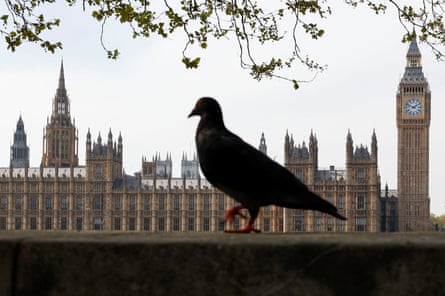British Steel is to deploy emergency measures in a race against time to save the blast furnaces at Scunthorpe, as the business secretary refused to guarantee the plant could get what it needed in time.
The company is understood to be looking at offers of help from more than a dozen businesses to obtain materials such as iron ore and coking coal, potentially allowing it to avoid the temporary shutdown of one of the two furnaces.
On Saturday, parliament passed a one-day bill containing emergency powers to gain control of the Scunthorpe site after its Chinese owner, Jingye, declined government support to keep the plant running over the next few weeks. British Steel’s UK management team is scrambling to buy the materials, with help from government officials.
The business secretary, Jonathan Reynolds, has declined to directly accuse Jingye of sabotaging the plant but it is understood ministers do not expect the company to return to any negotiations. Reynolds said the emergency government steel action meant there was now a “high trust bar” for Chinese companies to invest in critical UK industries.
“It might not be sabotage, it might be neglect,” Reynolds told the BBC on Sunday. “The conscious decision not just to not order raw materials but to sell existing supplies of raw materials is the significant change that required the government to step in.”
Reynolds said there would not be a full ban on Chinese investment in UK industry, with MPs raising questions about whether companies would be allowed to invest in a planned new nuclear site. The chancellor, Rachel Reeves, has been on a charm offensive with Beijing to try to attract investment.
On Sunday, the Guardian revealed the government could target parts of China’s security apparatus under new foreign influence rules to be announced in the coming months. China as a whole is not expected to be included on the enhanced tier of the foreign influence registration scheme.
Reynolds said the costs to the UK economy of closing the plant and losing the country’s steelmaking capacity – plus the significant job losses it entailed – would have been at least £1bn, more than the losses expected from nationalising the plant.
A decision on full nationalisation is expected to be taken in the next fortnight if the plant can continue operation.
Reynolds told the BBC’s Laura Kuenssberg he would not “make [his] situation or the nation’s situation more difficult” by giving further details on whether the steel blast furnaces would be able to continue operating.
If the furnaces run out of raw materials, they could go through an uncontrolled cooling, making it prohibitively expensive to restart production.

Speaking on Monday morning, the Treasury minister James Murray said the government was “doing everything we can” to get the necessary raw materials to the site in time, but offered no guarantees.
“The coal is in the UK,” he told Sky News. “There’s a process of getting it into the blast furnaces. There’s a slight limit on what I can say because of commercial decisions being taken, but we’re doing everything we can to get that coal into the blast furnaces to make sure that the operations continue.”
Asked if he could guarantee that the furnaces would stay on, he said: “I can categorically say that we as a government are doing everything we can to make sure they continue.”
Last week, Jingye ordered British Steel to temporarily shut down one blast furnace on Monday in order to eke out remaining materials. However, the process – known as a salamander tap – is complicated and generally avoided unless repairs are needed. British Steel managers are looking at whether this can be avoided.
While some materials at Immingham port on the Humber estuary in Lincolnshire are awaiting payment, British Steel is trying to find materials for the coming weeks, with some shipments taking up to 45 days to arrive.
Jingye, which bought British Steel in 2019 – when Boris Johnson was prime minister – had stopped ordering more raw materials and begun selling off its supplies, declining an offer of £500m in support and refusing to guarantee the furnaces could continue operating.
“It became clear to me and to the government, no financial offer of any generosity would have been accepted,” Reynolds said. “This was the situation on [Thursday] 10 April, on the Friday we had agreement from the cabinet. On Saturday, parliament was recalled, and here we are.”

Officials from the Department for Business and Trade arrived at the Scunthorpe plant as soon as the legislation came into force on Saturday, the government said on Sunday.
The business secretary told Sky News there was a “high trust bar” for bringing Chinese investment into the UK and said he would not have allowed a Chinese company to invest in the “sensitive” steel sector.
Reynolds said the company had annual losses of £233m and that figure “can be improved upon”. But he said the cost of nationalisation had to be compared with the cost of allowing the plant to go under.
He said it would not mean any further borrowing to nationalise the plant. “We’ve got an allocation in the first budget for a steel fund of over £2.5bn.
“If we are spending some of that money to support, in the short term, steel, I think that’s better for the taxpayer than spending a greater sum of money on a transition with a company I’m not sure right now I could rely on, or to be frank … the complete collapse of British Steel, with a cost to the exchequer of many multiples [of that].
“If that had gone down, that number of jobs, the land remediation, support to those who lost their jobs, that would be well over £1bn.”
Reynolds said he would not make accusations of Chinese state interference, but the company was “not [acting] in the kind of rational way we’d expect a company to operate in a market economy”.
The Reform UK leader, Nigel Farage, accused Jingye of lying about the company’s accounts and said he was “100% certain” the Chinese government had ordered Jingye to buy British Steel in order to close the business. Farage offered no evidence for those accusations and said it was based on his “intuition”.
“Why do you think that yesterday morning the trade unions acted to stop the Chinese officials even getting their cars into the plant? Because they feared industrial sabotage,” Farage said.
The GMB trade union general secretary, Gary Smith, confirmed workers had acted to stop the company gaining access. “We were worried about industrial vandalism and there was a worry about sabotage on the site, quite frankly,” he said. “And yesterday, workers did prevent executives from the Chinese owners from going on site.
“I’m sure that people are still very worried about that, but these people performed heroics yesterday to ensure that we’ve got a fighting chance for the steel industry in this country. They were legitimately concerned about industrial sabotage.”
Source: theguardian.com


